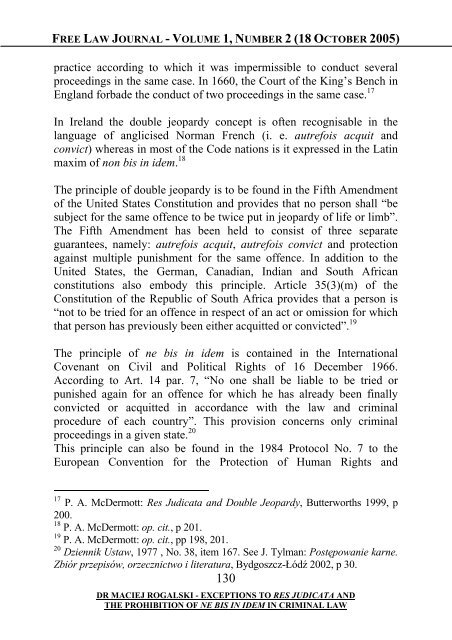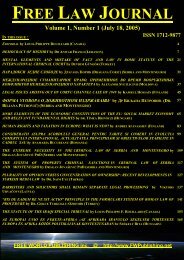FREE LAW JOURNAL Volume 1, Number 2 (October 18, 2005)
FREE LAW JOURNAL Volume 1, Number 2 (October 18, 2005)
FREE LAW JOURNAL Volume 1, Number 2 (October 18, 2005)
You also want an ePaper? Increase the reach of your titles
YUMPU automatically turns print PDFs into web optimized ePapers that Google loves.
<strong>FREE</strong> <strong>LAW</strong> <strong>JOURNAL</strong> - VOLUME 1, NUMBER 2 (<strong>18</strong> OCTOBER <strong>2005</strong>)<br />
practice according to which it was impermissible to conduct several<br />
proceedings in the same case. In 1660, the Court of the King’s Bench in<br />
England forbade the conduct of two proceedings in the same case. 17<br />
In Ireland the double jeopardy concept is often recognisable in the<br />
language of anglicised Norman French (i. e. autrefois acquit and<br />
convict) whereas in most of the Code nations is it expressed in the Latin<br />
maxim of non bis in idem. <strong>18</strong><br />
The principle of double jeopardy is to be found in the Fifth Amendment<br />
of the United States Constitution and provides that no person shall “be<br />
subject for the same offence to be twice put in jeopardy of life or limb”.<br />
The Fifth Amendment has been held to consist of three separate<br />
guarantees, namely: autrefois acquit, autrefois convict and protection<br />
against multiple punishment for the same offence. In addition to the<br />
United States, the German, Canadian, Indian and South African<br />
constitutions also embody this principle. Article 35(3)(m) of the<br />
Constitution of the Republic of South Africa provides that a person is<br />
“not to be tried for an offence in respect of an act or omission for which<br />
that person has previously been either acquitted or convicted”. 19<br />
The principle of ne bis in idem is contained in the International<br />
Covenant on Civil and Political Rights of 16 December 1966.<br />
According to Art. 14 par. 7, “No one shall be liable to be tried or<br />
punished again for an offence for which he has already been finally<br />
convicted or acquitted in accordance with the law and criminal<br />
procedure of each country”. This provision concerns only criminal<br />
proceedings in a given state. 20<br />
This principle can also be found in the 1984 Protocol No. 7 to the<br />
European Convention for the Protection of Human Rights and<br />
17<br />
P. A. McDermott: Res Judicata and Double Jeopardy, Butterworths 1999, p<br />
200.<br />
<strong>18</strong><br />
P. A. McDermott: op. cit., p 201.<br />
19<br />
P. A. McDermott: op. cit., pp 198, 201.<br />
20<br />
Dziennik Ustaw, 1977 , No. 38, item 167. See J. Tylman: Postępowanie karne.<br />
Zbiór przepisów, orzecznictwo i literatura, Bydgoszcz-Łódź 2002, p 30.<br />
130<br />
DR MACIEJ ROGALSKI - EXCEPTIONS TO RES JUDICATA AND<br />
THE PROHIBITION OF NE BIS IN IDEM IN CRIMINAL <strong>LAW</strong>

















